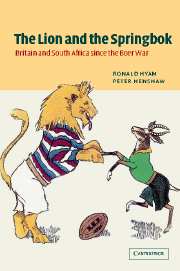Book contents
- Frontmatter
- Contents
- List of illustrations
- List of tables
- Preface
- Acknowledgements
- List of abbreviations
- 1 The uneasy special relationship: dynamics and divergencies
- 2 Breakdown: into war, 1895–1899
- 3 Post-war: the myth of magnanimity, 1905–1907
- 4 African interests and the South Africa Act, 1908–1910
- 5 ‘Greater South Africa’: the struggle for the High Commission Territories, 1910–1961
- 6 The economic dimension: South Africa and the sterling area, 1931–1961
- 7 Britain, the United Nations, and the ‘South African disputes’, 1946–1961
- 8 The political consequences of Seretse Khama and Ruth, 1948–1952
- 9 Containing Afrikanerdom: the geopolitical origins of the Central African Federation, 1948–1953
- 10 Strategy and the transfer of Simon's Town, 1948–1957
- 11 The parting of the ways: the departure of South Africa from the Commonwealth, 1951–1961
- 12 Enfeebled lion? How South Africans viewed Britain, 1945–1961
- 13 Springbok reviled: some British reactions to apartheid, 1948–1994
- Epilogue The relationship restored: the return of the new South Africa to the Commonwealth, 1994
- Select bibliography
- Index
12 - Enfeebled lion? How South Africans viewed Britain, 1945–1961
Published online by Cambridge University Press: 03 December 2009
- Frontmatter
- Contents
- List of illustrations
- List of tables
- Preface
- Acknowledgements
- List of abbreviations
- 1 The uneasy special relationship: dynamics and divergencies
- 2 Breakdown: into war, 1895–1899
- 3 Post-war: the myth of magnanimity, 1905–1907
- 4 African interests and the South Africa Act, 1908–1910
- 5 ‘Greater South Africa’: the struggle for the High Commission Territories, 1910–1961
- 6 The economic dimension: South Africa and the sterling area, 1931–1961
- 7 Britain, the United Nations, and the ‘South African disputes’, 1946–1961
- 8 The political consequences of Seretse Khama and Ruth, 1948–1952
- 9 Containing Afrikanerdom: the geopolitical origins of the Central African Federation, 1948–1953
- 10 Strategy and the transfer of Simon's Town, 1948–1957
- 11 The parting of the ways: the departure of South Africa from the Commonwealth, 1951–1961
- 12 Enfeebled lion? How South Africans viewed Britain, 1945–1961
- 13 Springbok reviled: some British reactions to apartheid, 1948–1994
- Epilogue The relationship restored: the return of the new South Africa to the Commonwealth, 1994
- Select bibliography
- Index
Summary
How did South Africans view Britain in the period 1945 to 1961? While perceptions were as diverse as the identities of South Africans themselves, there was nevertheless a general perception that Britain and the British connection mattered far less in 1961 than they ever had before. It might be thought that this was an inevitable consequence of Britain's economic and strategic eclipse as a great power during the Second World War. The war certainly left Britain far behind the United States and the Soviet Union militarily. It also weakened Britain financially, and undermined its hold on its Asian empire. Britain's decline in the eyes of white South Africans seemed to be demonstrated by the fall in 1948 of the strongly pro-British government of Jan Smuts and by the advent of an Afrikaner nationalist government overtly hostile to the British connection. Britain's decline was further suggested by the tendency of African nationalists to turn away from Britain as a source of support in their struggle against racial oppression within South Africa. The establishment of a republic in South Africa and its exit from the Commonwealth in 1961 also seemed to confirm Britain's collapse. Historians have hitherto given little direct attention to South African perceptions of Britain in this period, perhaps because the British connection did not seem to matter much after 1945; or perhaps because the British government seemed to play little positive part in the struggle against apartheid.
- Type
- Chapter
- Information
- The Lion and the SpringbokBritain and South Africa since the Boer War, pp. 273 - 306Publisher: Cambridge University PressPrint publication year: 2003



